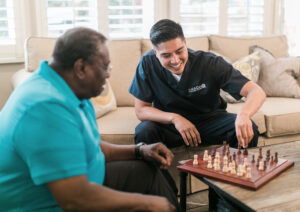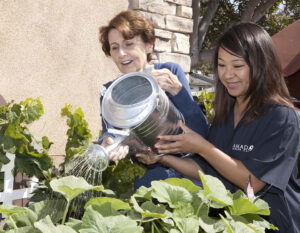As senior loved ones age—or as you begin to think ahead to your golden years for yourself—one of the most important decisions to make is how to get the right support at home. For many families, that starts with finding a caregiver who brings not only experience, but compassion, patience, and trustworthiness.
During National Certified Nursing Assistant (CNA) Week, June 12–18, we want to shine a spotlight on the essential role that CNAs and other care providers like Home Health Aides (HHA), Personal Care Aides (PCAs), and companion caregivers play in helping seniors live safely and comfortably at home. It’s also the perfect time to learn what makes a truly great caregiver—and how to choose the right kind of help when the time comes.
The roles of CNA, HHA, and PCA may differ in training and responsibilities, but together, they make it possible for older adults to remain safely and comfortably at home—where most prefer to be.
Understanding the Roles of CNAs, HHA, PCAs, and Companions in Senior Home Care
Many care providers employed at a trusted agency like Amada Senior Care are known primarily as non-medical caregivers. These care professionals focus on helping seniors stay independent with services like meal prep, errands, and friendly conversation. Their emotional support can be just as important as physical help.
Certified Nursing Assistants (CNAs)
CNAs are state-certified professionals trained to provide hands-on assistance with care under the supervision of licensed nurses. In home care, they may help with vital signs, mobility, bathing, dressing, toileting, and other essential daily needs. CNAs are especially critical for clients with complex conditions who require close attention and experienced care.
Home Health Aides (HHAs)
HHAs have similar training to CNAs, though it may vary by state. In addition to assisting with daily living tasks, some may provide basic health monitoring, such as checking blood pressure, and help coordinate care plans with nurses and therapists. HHAs are a lifeline for seniors managing chronic illness or recovering from injury or surgery.
Personal Care Assistants (PCAs)
PCAs are trained to support older adults with non-medical needs. They assist with grooming, meal preparation, mobility, and companionship. Their role is vital for helping seniors maintain independence and dignity, especially those who live alone or have limited family nearby.
Companion and Homemaker Caregivers
These caregivers provide comfort and connection, offering conversation, emotional support, and light housekeeping. They are a critical part of holistic care—addressing loneliness, safety, and the overall well-being of aging adults.
Why These Roles of CNAs, HHAs, PCAs, and Companions Matter
It’s easy to talk about care in terms of tasks and duties—but what truly defines the impact of CNAs, HHAs, PCAs, and caregivers is the human connection they provide. They build trust, offer a sense of safety, and become like family to those they serve.
Their presence allows older adults to stay in familiar surroundings, reducing hospital readmissions, enhancing quality of life, and often extending the ability to age in place. Studies show that seniors receiving consistent home care are 25% less likely to experience hospital readmissions.
What Makes a Great Caregiver?
Whether you’re looking for help after a hospital stay, managing a chronic illness, or simply need a little more day-to-day support, here are the qualities that set the best caregivers apart:
Compassion and Empathy—The best caregivers treat seniors with kindness, respect, and understanding. They don’t just follow a list of tasks; they build real connections.
Patience—Caregiving can be emotionally and physically demanding. A calm, patient demeanor is key when helping someone with memory loss, mobility issues, or anxiety.
Reliability—Families count on caregivers not just to show up, but to show up prepared and consistent. That peace of mind is priceless.
Clear Communication—Good caregivers keep everyone in the loop. They know how to listen, report changes, and work with family members and healthcare teams.
Attention to Detail—From meals and medications to safety and routines, small things matter in a big way when it comes to senior care.
Problem-Solving Ability—Every day in home care is different. Great caregivers are quick thinkers who can handle surprises and keep their clients safe and comfortable.
How to Show Appreciation During CNA Week and Beyond
Here are a few meaningful ways to recognize these essential caregivers:
Say Thank You — A heartfelt, handwritten note or a simple “thank you” goes a long way. Acknowledge specific ways the caregiver has made a difference.
Give a Thoughtful Gift — Small tokens of appreciation like a gift card for coffee or food, a self-care kit, flowers or plant, or a favorite treat—can brighten their week and small gestures go a long way.
Share Kudos with the Care Agency—Alert the caregiver’s employer about the great job she or he is doing. Many agencies run a Caregiver of the Month or similar recognition program and your recommendation may lead to an award. During Amada Senior Care’s annual conference last Fall, our six caregiving honorees were treated to a wonderful weekend in Southern California, enjoying great weather and activities and being pampered. The treat-filled weekend wrapped up with an awards ceremony during which they were recognized and feted.
Involve Family Members— Encourage family members to write testimonials or short thank-you videos for the caregivers who support their loved ones.
Appreciating our CNAs, HHAs, PCAs, and Companions at Amada Senior Care
To every CNA, HHA, PCA, and caregiver on our Amada Senior Care team and across the industry—we see you, we appreciate you, and we thank you. Your work is not only valuable; it is deeply meaningful. You bring comfort, stability, and joy to the lives of so many. As care professionals, you are truly the heartbeat of senior home care.















